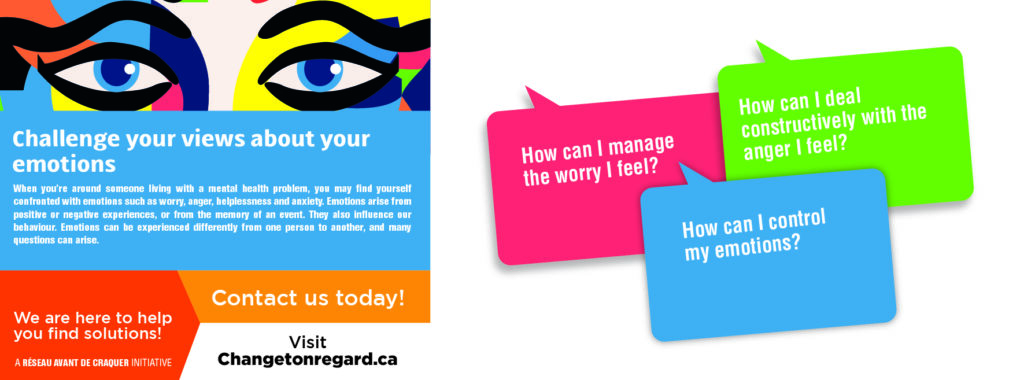Challenge your views about your emotions : a few tips to help you deal with them while still being there for the person

When you’re around someone living with a mental health problem, you may find yourself confronted with emotions such as worry, anger, helplessness and anxiety. Emotions arise from positive or negative experiences, or from the memory of an event. They also influence our behaviour. Emotions can be experienced differently from one person to another, and many questions can arise.
There are strategies for dealing with your emotions. Here are a few tips to help you deal with them while still being there for the person.
How can I manage the worry I feel?
As an ally, it’s normal to feel anxious, especially in times of change, when the person you’re supporting isn’t doing so well, is hospitalized, or when you’re experiencing a lot of uncertainty about your role and responsibilities. To manage your worries in a healthy way, here are some tips:
-
- Find out more about the person’s mental health disorder so you can better understand what they’re going through and what their needs are. A better understanding can help ease some of your fears.
- Identify the situations or thoughts that trigger your worries. By recognizing them, you can deal with them proactively.
- Avoid information overload and refer to specialized websites that provide the right information for your situation. Focus on useful, positive information.
- Make time for your own hobbies and needs. Practising mindfulness or meditation can also be a great way to focus on the present moment and appease your worries.
- Set boundaries for yourself in terms of support and availability. It’s essential to preserve your own health while supporting others.
- Talk to a friend, family member or professional if you feel overwhelmed by your worry. Sometimes, sharing your feelings can help relieve them and lessen the emotional burden.
How can I deal constructively with the anger I feel?
Anger can arise when you’re faced with difficult situations. Anger is a defensive reaction to aperceived threat, loss or stress. This reaction can be brought about by an internal or external trigger. Anger is a powerful emotion, but it can be controlled.
Here are some tips for dealing constructively with anger:
- When you feel angry, give yourself a moment to calm down before reacting. Take a deep breath and distance yourself from the source of frustration if necessary.
- Try to understand the reasons behind your anger. Sometimes anger masks other emotions, like sadness or fear.
- Find healthy ways to release your anger, such as exercising, writing or taking up a creative hobby.
- If the anger persists, discuss it with the person in a calm, respectful manner. When you’re ready to address the situation, choose your words carefully. Use ‘’i’’ instead of ‘’you’’ to express your feelings without accusing others.
- Open communication can foster better mutual understanding.
- Try to put yourself in the other person’s shoes and see the situation from their point of view. This can help you manage your anger in a more constructive way.
- Avoid taking things personally. Remember that symptoms related to a mental health disorder are not directed at you personally.How can I control my emotions?
How can I control my emotions?
The more intense the emotions, the greater the risk of them influencing our behaviour. Controlling emotions is a constant challenge, but with practice, it becomes easier. Here are some strategies to get you there:
- Practise self-compassion. This means being kind to yourself and accepting that you may feel a variety of emotions when faced with a situation over which you have no control.
- Learn to recognize and understand your own emotions and those of others. The more aware you are of your emotions, the more effectively you’ll be able to deal with them.
- Set limits for yourself in terms of support and availability. It’s essential to preserve your own health while
- Cultivate a healthy routine with sufficient sleep, a balanced diet and regular physical activity. This can have a positive impact on your emotions and general well-being.
- Join a support group for young friends and family in similar situations. Sharing experiences can be beneficial. If you’re feeling overwhelmed by your emotions, don’t hesitate to ask a youth worker for help.
Supporting someone living with a mental health problem can be emotionally challenging, but it’s essential to deal with your concerns, anger and emotions in a healthy way. It’s an ongoing journey that requires patience and practise.





